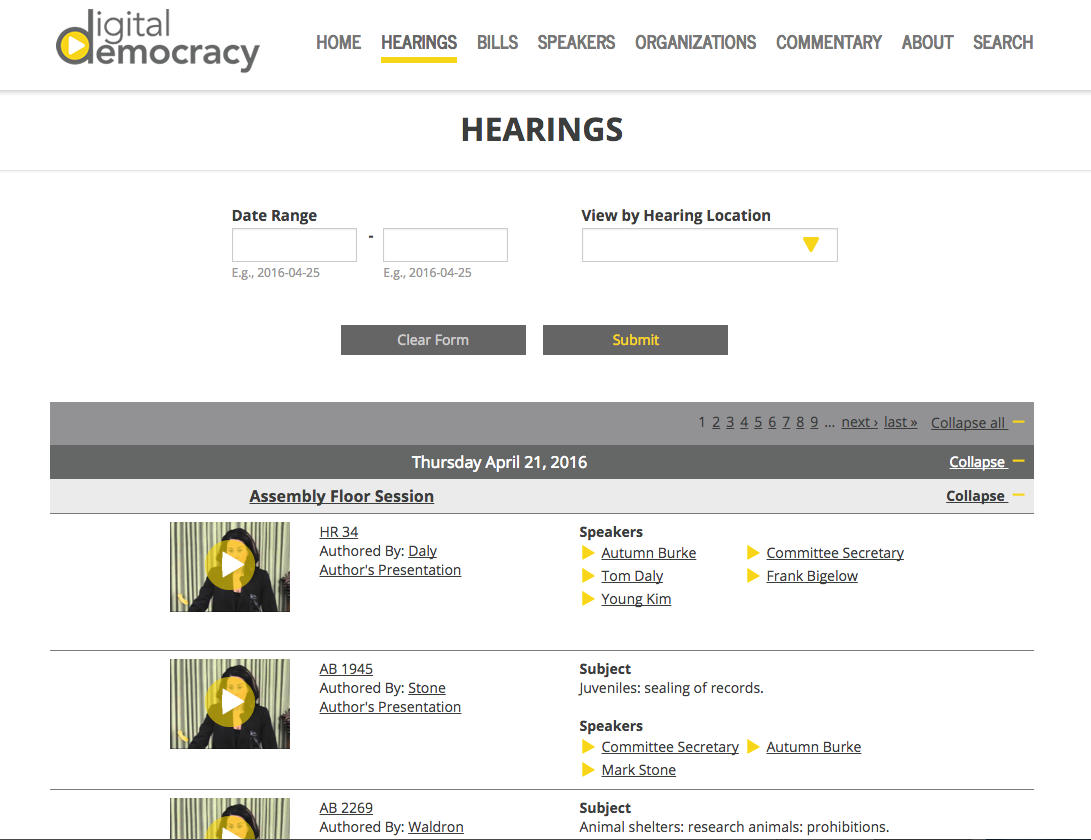Every year in California’s state capital, 120 full-time lawmakers, 2,000 full-time staff, and 130 legislative committees, introduce an average of 5,000 bills each legislative session, thus creating a booming industry for California’s 1,100 registered lobbyists. They do this with a $150 billion annual budget. And they do this while simultaneously managing to keep out most of the public.
In 2015, former State Sen. Sam Blakeslee, tackled head-on the problem of transparency in politics when he launched the Digital Democracy Project at the “Institute for Advanced Technology and Public Policy,” at Cal Poly San Luis Obispo. Digital Democracy provides a searchable database of all legislative hearings in California. The end goal is to significantly empower citizens to better understand and engage in the legislative process.
Now Digital Democracy Platform has launched new interactive features for 2016 to their open government platform including legislative floor sessions to the searchable archive, an email alert system, organization profiles, and custom video storing and editing capabilities, enhancing and expanding Digital Democracy’s efficacy.
“Every lawmaker will sit up and take notice when they realize that the public is now able to instantly find and listen to everything they say in committee or on the floor,” said Institute Director and former California State Senator Sam Blakeslee. “But what will rock their world and bring real accountability is when they see those video clips of themselves circulating on social media, on blogs, and in the feeds of their hometown press. This unleashes an unprecedented level of citizen access, oversight and accountability.”
The goal is to make California state government more transparent and accessible to grassroots groups, citizens, and to provide broader opportunities to improve civic engagement. I am a contributor to Digital Democracy, and am very excited about the new interactive features.
“Digital Democracy is at the cutting edge of open and accountable government,” said Blakeslee. “Our new 2016 features make it even easier for the public to meaningfully track and influence their issues and electeds.”
Digital Democracy was built by Cal Poly students and faculty at the IATPP. The online platform uses voice and facial recognition technology, data mining and natural language processing to provide Californians access to state legislative policy hearings and floor sessions. The GoogleTM-like search functionality allows users to identify key capitol players and their connections to campaigns, interest groups and other legislative actions. This first-of-its-kind online tool uses 21st century technology to open California’s government and empower all citizens with a voice in Sacramento.
Digital Democracy 2016 features:
Addition of Floor Sessions:
Once legislation has passed specific policy committees, bills are next debated and voted on in wider floor sessions that include the entire elected body of both the Senate and the Assembly. Digital Democracy currently provides users the ability to search specific legislative testimony within Senate or Assembly policy committees. The new feature provides the public the ability to apply the same search and content export capabilities to floor sessions.
Proactive Email Alert System:
The IATPP team developed an email alert system that allows users to create a free Digital Democracy account, enter the keywords, phrases, bills, and/or speakers they want to follow, and receive an email notification when new video content is added to the site matching their specific criteria.
Custom Video Editing and Archiving:
By creating a free Digital Democracy account, users can create custom video clips of the key moments of interest. These clips are saved and stored the user’s private account, and can be quickly and easily shared through social media or embedded in a website or newsletter.
Organization Profiles
In addition to being able to search hearing videos, users are able to navigate content organized by speaker or bill by viewing individual profile pages. The new organization profile pages now allow users to view also testimony offered by representatives of an interest group. The collection of videos displays the bill on which the organization testified and their position on the legislation.
The Institute for Advanced Technology and Public Policy
Under the guidance of Sam Blakeslee, the nonpartisan, interdisciplinary organization’s mission is to develop practical solutions to societal issues by informing and driving public policy through advanced technology. Teams of Cal Poly faculty and students, together with public policy leaders and industry experts build technology solutions to pressing real world problems.


